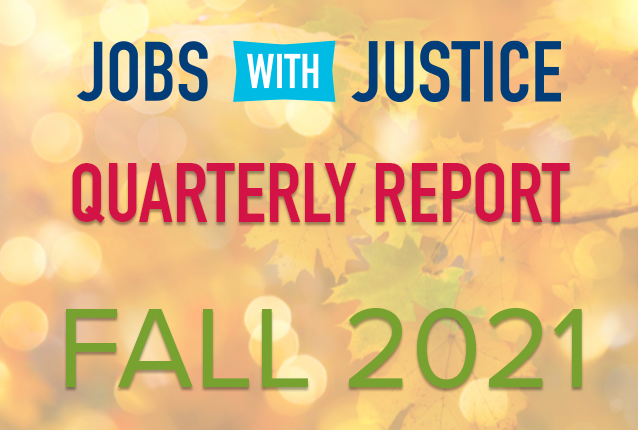Welcome to the Fall 2021 edition of Jobs With Justice quarterly newsletter! This update provides you – our most dedicated supporters and allies – a way to dig into the ongoing campaigns and work of Jobs With Justice and our network throughout the year. We hope you enjoy it!
Major Victories
Portland Jobs With Justice Played Key Role in Nabisco Victory
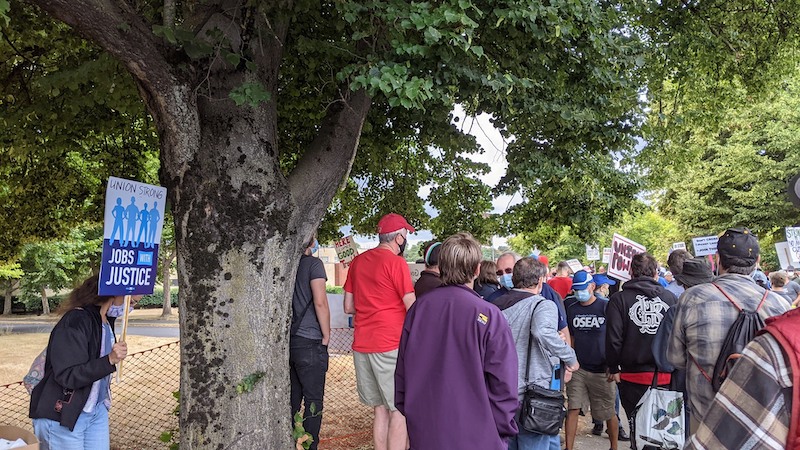
When Bakers Union Local 364 decided to go on strike in August, there were still a lot of unknowns. Looking to hold on to wages, schedules, and benefits and frustrated with Mondelez International’s refusal to concede to the most reasonable demands, the Portland local and its members decided to walk out of its Columbia Boulevard location, unsure of what the future would bring. But for The Rose City and the workers that call it home, a fighting spirit can get you far, regardless of what’s in front of you.
“I think it’s Portland in general, not just Nabisco workers. We are different here. We are fighters in this little city. We are known for food carts, and we are known for protesting,” says Donna Jo Marks, a leader in local 364. The strike, also known as the Nabisco Strike, lasted 40 days, covering the months of August and September. The National Bakery, Confectionery, Tobacco Workers, and Grain Millers’ International coordinated the walkout in Portland, and helped plan actions near Chicago, Richmond, Denver, and Atlanta. The resulting ripple effect generated national media attention about how the company behind snacks like Oreos, Chips Ahoy, and Triscuits treats its workers.
While growing national awareness about the struggle helped inform a much larger audience, it was the community support that local union members found invigorating. “Once we were out in the street, it was apparent to see the support we had from the community, including the acts of kindness from strangers. Their support boosted us and let us know that we had the community support, and as days and weeks went on, that support grew and made it very easy for us to continue,” recalls Mike Burlingham, another leader in local 364.
Within several days of the strike, Portland Jobs With Justice joined with their local DSA chapter and other community allies to organize a solidarity rally. For the next five Saturdays, they organized rallies with clergy, local politicians, union leaders, and strikers themselves. For Burlingham, the impact of these actions was undeniable. “It made a difference in getting the company to come to the table and negotiate in good faith. Seeing that many people at the rallies come out and learn about other people’s struggles. It’s inspiring,” he points out.
Community support for the strike came from other unions visiting the picket line, cars honking, and even community members using inventive techniques to confront strikebreakers. The strike lasted 40 days and ended in September when members of BCTGM voted to end the strike, while the Portland workers who were first to go out on strike overwhelmingly voted no and organized a “no” vote over concessions around their top demands. For Marks, the strike represented a unique opportunity to build bridges destroyed during the previous presidential administration. “We came together, and we stopped a bully, and now the little fires we started have spread, and we are going to start the next one. This is just the beginning of something greater than us,” she declared.
DHS Announces Historic Protections for Undocumented Workers
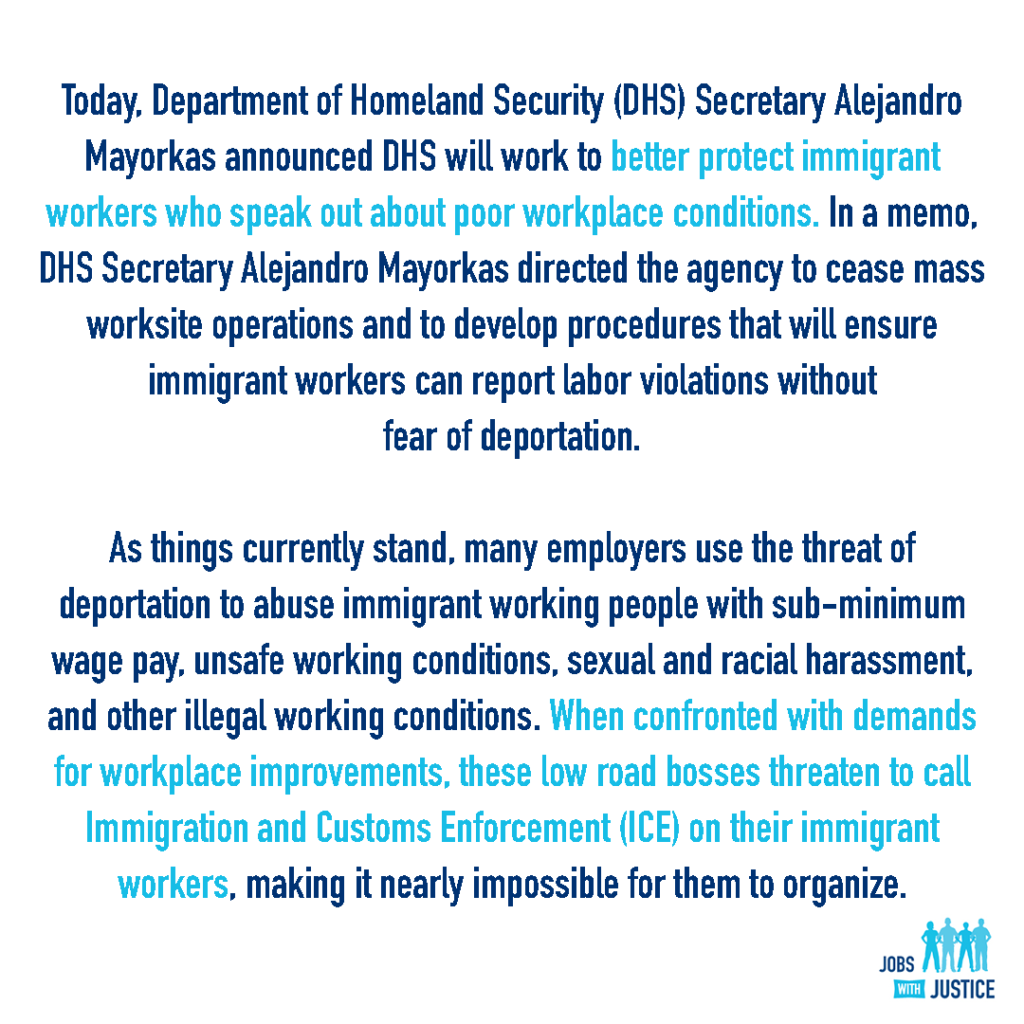
On October 12th, Secretary Alejandro N. Mayorkas of the Department of Homeland Security (DHS) sent a memo to agency leaders outlining a policy change to create the first systematic protections for undocumented workers in the United States. Secretary Mayorkas’s administrative action mirrors much of the long-supported Jobs With Justice Protect Our Workers from Exploitation & Retaliation–or POWER–Campaign.
Secretary Mayorkas’s memo outlines a new enforcement model focused on safeguarding undocumented workers from deportation when they assert rights under federal law by reporting their employers for labor and employment abuses.
Responding to this huge victory for workers, Jobs With Justice issued the following statement:
Today, Department of Homeland Security (DHS) Secretary Alejandro Mayorkas announced DHS will work to better protect immigrant workers who speak out about poor workplace conditions. In a memo, DHS Secretary Alejandro Mayorkas directed the agency to cease mass worksite operations and to develop procedures that will ensure immigrant workers can report labor violations without fear of deportation.
As things currently stand, many employers use the threat of deportation to abuse immigrant working people with sub-minimum wage pay, unsafe working conditions, sexual harassment, and other illegal working conditions. When confronted with demands for workplace improvements, these low road bosses threaten to call Immigration and Customs Enforcement (ICE) on their immigrant workers, making it nearly impossible for them to organize.
JWJ will remain vigilant of how DHS implements this new enforcement strategy. We hope that these changes truly bring equity and discourage unscrupulous employers from intimidating or retaliating against immigrant workers who engage in organizing activities.
Waves of Labor Actions in the Northeast
Home Care Workers Fighting for Justice in the Constitution State
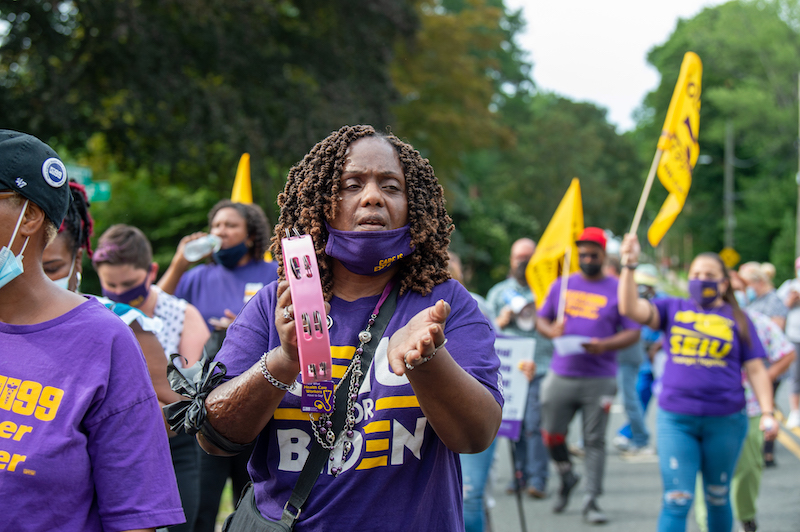
Following a significant victory that resulted in a new contract for 2,800 workers across 26 Connecticut nursing homes, Service Employees International Union (SEIU) District 1199 New England is looking to score another breakthrough for the 10,000 independent personal care workers that serve 6,000 patients in the Constitution State. Through support for the essential worker table, Jobs With Justice was able to play an indirect role in supporting SEIU New England 1199.
On August 3rd, a group of these workers assembled at the Hartford residence of Connecticut Governor Ned Lamont and called on him to use the $200 million the state received in federal COVID-19 relief funds to pay for wage increases and benefit packages for home health care aides. “These actions are part of a coordinated campaign across long-term care to lift a long-term care worker bill of rights that would bring all these workers into a common set of standards, says Diedre Murch, home care director for New England 1199. These demands also include the ability to retire and access to paid time off.
Because home care workers are employed under the consumer-directed Medicaid waiver program, they are considered publicly funded employees. This legal distinction means they do not have the right to strike like their group care counterparts, who are currently striking against Sunrise Inc., a major employer that runs group home programs for the intellectually disabled across Connecticut. However, both groups are fighting their respective struggles under one banner.
Turnover rates in the home care industry remain high, with estimates ranging between 33 and 50 percent. The COVID-19 pandemic has only further exposed the challenges home care workers and the patients in their care face while reiterating the need for a new contracting addressing workers’ demands.
“It’s a travesty that we have people caring for patients that are very vulnerable, yet their caregivers don’t have health insurance for their health or sick time both to protect themselves and the person they are caring for.” Home care work is one of the fastest-growing jobs in the country, and activists are pushing the state to transform this profession from a job with poverty-level wages and benefits into a valued and respectable career. For Murch and others, this is a 400-year-old problem as much as it is a run-of-the-mill employee/employer fight.
“With home care workers, given that it’s mostly women and people of color, It’s impossible to divorce the reality of home care workers today who don’t have health insurance, retirement, living wages, sick time with the last 400 years of structural racism that has devalued the work that women and people of color do. If this were not a workforce that was mostly women and people of color, we don’t think that we would be struggling for such basic, basic protections,” she argues.
Massachusetts Jobs With Justice Standing with Worcester Nurses in Month 8 of Strike
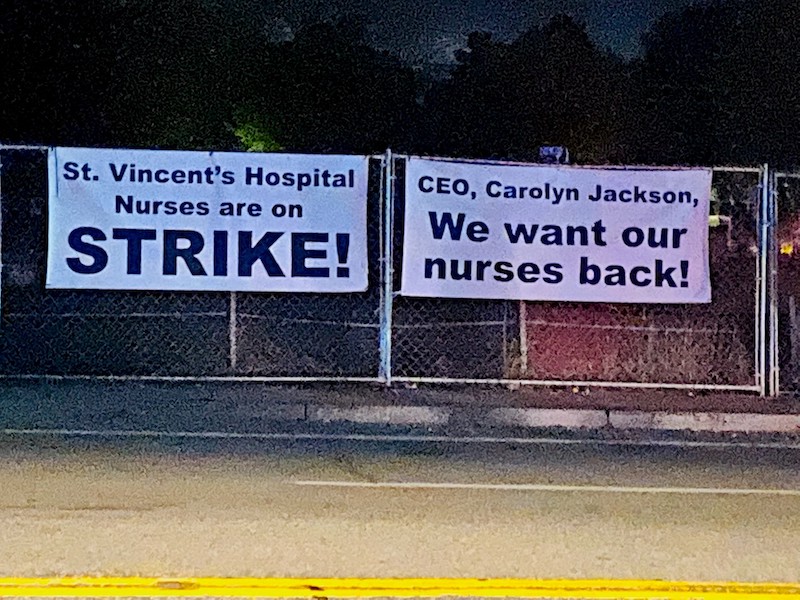
After eight months, the 700 nurses at St. Vincent Hospital in Worcester, Massachusetts, remain on strike as they fight for better staffing to ensure patient care. A potential agreement to end the strike was scuttled in August, when the hospital insisted that the nurses accept an illegal back-to-work provision that would not guarantee them the ability to return to their previous positions, ultimately displacing hundreds of the nurses. Political leaders, labor, and social justice organizations around the country continue to reject the hospital’s position and demand nurses be allowed to return to their jobs following the strike’s conclusion.Massachusetts Jobs With Justice continues to support and advocate for the nurses’ cause, most recently posting banners and handing out fliers calling for the nurses’ return at the entrance to the Boston Marathon. To read more about the Worcester nurses’ strike, click here.
Campaign Updates
5 for Farmworkers in Fires Campaign Invigorates Organizing in Wine Country
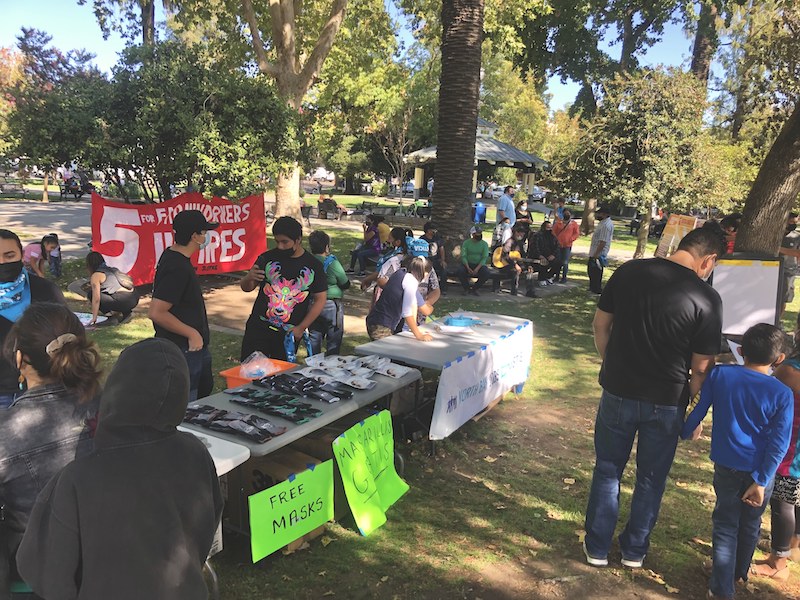
You would be hard-pressed to find a state that has experienced the ravages of climate change like California. Coastal erosion, droughts, rising sea levels, and wildfires have all impacted the Golden state, creating mass chaos and countless uprooted lives. In Sonoma County, home to much of the state’s wine production, this latter dynamic has galvanized farmworkers, creating a wave of organizing in the area that hasn’t been seen in some time.
“They used to call this area wine country, we would say it’s worker country, but now its fire country,” remarks Davin Cardenas, an organizer at North Bay Jobs With Justice. Starting in April of this year, a six-person committee of farmworkers surveyed other farmworkers about their essential needs during wildfire season. The questionnaire had over 100 respondents, and from this survey emerged a list of five priorities that would eventually make up the 5 For Farmworker in Fires Campaign. These priorities were: Language justice, disaster insurance, community safety observers, premium hazard pay, and clean bathrooms + water.
From there, the committee leading the campaign has met twice a month and holds one community meeting a month. Meetings have been held in public parks, and turnout increases with each subsequent event, ranging from 30 at the first event to 70 at the most recent meeting. The group has also helped establish a texting database of over 700 farm workers, all of whom were–until recently–unorganized.
For Margarita Garcia, an organizer in the campaign, social justice, and self-determination are essential. “I’m a farmworker, and I’m indigenous. I work in the fields and right now harvesting, so I know the needs of farmworkers in our community. Sometimes we don’t get paid what we’re supposed to, and there isn’t fair pay. When there are fires, we don’t stop, [and] we continue working.”
While the California wine industry generates roughly $1.9 billion in annual revenue and is infamous for its exploitative working conditions and low pay, this new campaign focused on something new: highlighting the industry’s harm to the environment. Unsurprisingly, climate change is playing a role in how organizers think about justice for farmworkers. “We are making a direct connection between climate change and worker justice, and it’s at this intersection where we find the basis of our campaign,” Cardenas said.
What we see in California’s Wine Country is a brilliant fusion of the labor and environment justice movements. We’re engaging the public in a way that demonstrates how both issues are directly connected and how companies’ exploitation of working people often means the exploitation of our planet as well.
ABSI Introducing Groundbreaking Movement Fellows Program
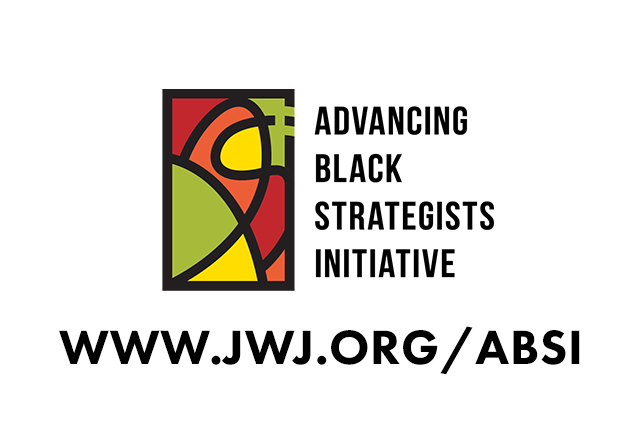
There is a vital need for Black leadership at all levels of movement work. Because of this, the Advancing Black Strategists Initiative (ABSI) is looking to develop experienced and well-trained Black strategists through its Movement Fellowship Program. This paid apprenticeship program offers a cohort of Black worker-leaders direct experience developing and implementing strategies that seek to expand organizing and collective bargaining power with Black-led campaigns in the US South.
With focused strategies that seek to expand workers’ direct role in creating, implementing, and enforcing new standards beyond simply passing policy, the Fellows will examine the effects of race, class, gender, and power on workers across the South. They will inform the national discourse on expanding organizing and collective bargaining power for everyone based on these experiences. At the end of this twelve to eighteen-month Fellowship, ABSI will produce a cohort of Black strategists committed to leading, developing, and advancing practices that support working people’s ability to govern through expanded forms of collective bargaining in the South and beyond.
Stay tuned as these fellows enter their new positions and expect updates on them and their respective campaigns in subsequent newsletters.
The Always Essential Fellowship Seeks to Train the Next Generation of Worker Leaders
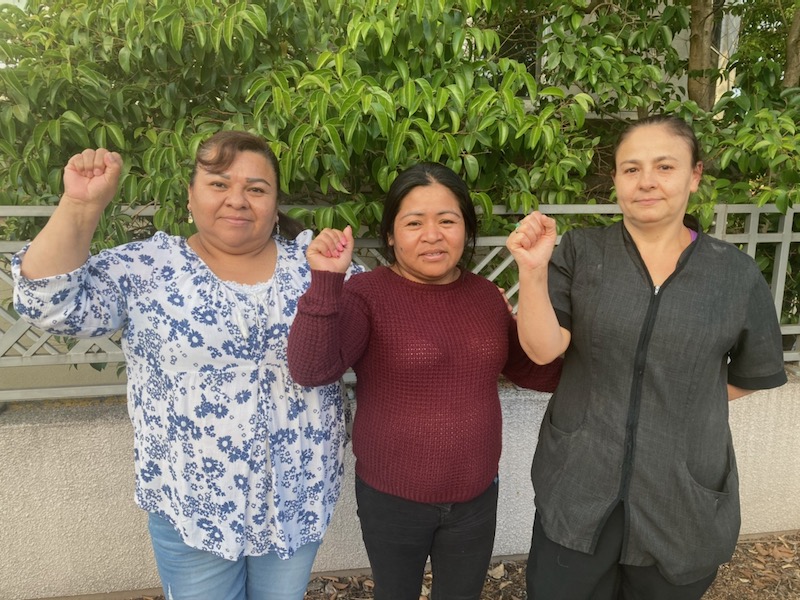
Launched in June, the Always Essential Fellowship is an online popular education and skills training program that brings essential worker leaders from across the country together for five-to-seven months with incredible trainers, guest speakers, and courses to learn from each other. Class topics range from storytelling to scale, social media as an organizing tool, developing powerful proposals, workplace organizing, passing policy, and understanding power.
Our current fellowship has 38 essential worker leaders from across the country, ranging from retail to construction and from farmworkers to domestic workers and beyond. The Always Essential Fellowship provides these worker leaders with the skills to level up their campaigns, leadership, and ultimately the ability to continue building a movement of essential workers collaborating to ensure the future prioritizes workers that make our communities strong and healthy. When essential workers build and strategize together, they can create a stronger future for us all.
“The fellowship classes have shown me how important the work I am doing with my organization is, and it’s felt so powerful to hear from other workers around the country and know that we are all fighting for the same things together.” – Jonny Ramirez, Worker Defense Project
If you want to be involved in the fellowship, please reach out to us at mara@united4respect.org
In Case You Missed It
17th Annual Awards Celebration a Huge Success

It was a magnificent evening on October 6th as we watched from the comforts of our couches, favorite chairs, and patios, the virtual 17th annual Eleanor Roosevelt Human Rights Awards Celebration, hosted by our Executive Director, Erica Smiley. Throughout the ceremony, Jobs With Justice Education Fund honored and celebrated some exceptional leaders and visionaries in our movement, including former President Kenneth E. Rigmaiden of the International Union of Painters and Allied Trades (IUPAT), The Amazon Workers of Bessemer, Alabama, and the Retail, Wholesale and Department Store Union (RWDSU), The Writers and Cast of the NBC show “Superstore” as well as Discount Foundation Legacy Award Winner Crispin Hernandez. The always phenomenal silent auction returned with luxurious vacation packages, exquisite restaurant gift cards, one-of-a-kind gifts, and more, helping make the night an unqualified success.

